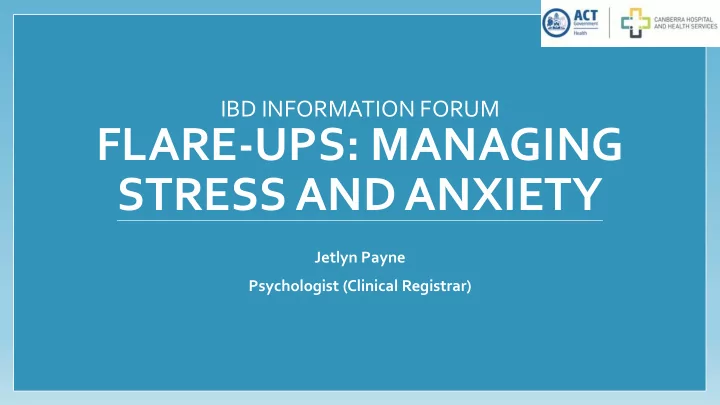

IBD INFORMATION FORUM FLARE-UPS: MANAGING STRESS AND ANXIETY Jetlyn Payne Psychologist (Clinical Registrar)
Overview Mind-body integration Connection between IBD and stress/anxiety Recognising symptoms of stress and anxiety Managing stress and anxiety
Mind-Body Integration Thoughts “people might notice if I’m in the bathroom for too long at Our thoughts, feelings and behaviours are all the party” connected and influence one another. Physical Behaviours Sensations Avoid eating at the party in Stomach pain order to avoid Tightness in “In mind -body medicine, the mind and body needing the abdomen bathroom are not seen as separately functioning entities, but as one functioning unit. The mind and Feelings emotions are viewed as influencing the body, Anxiety as the body, in turn, influences the mind and Embarrassment Shame emotions” ( Selhub, 2007)
Effect of Stress Stress Indirect effects Direct effects • Stimulates behaviours promoting relapse • Stopping medication • Smoking and drinking Alteration Activates Stimulates Stimulates Increases • Poor diet of cytokine mucosal the secretion the secretion of permeability profile mast cells of central CRF peripheral CRF Reduces Influences Exacerbates Exacerbates Regulates mucosal gastrointestinal immune immune ACTH-cortisol barrier motility dysfunction dysfunction system function Source: Sajadinejad, Asgari, Molavi, Kalantari and Adibi (2012)
Recognising Symptoms of Stress What is helpful stress? What is unhelpful stress? Feeling Irritable or Angry? You may be more easily upset when under increased stress, such as when dealing with a new diagnosis or adjusting to ongoing stress of a chronic illness.
Recognising Symptoms of Anxiety Over the past two weeks how often have been bothered by the following issues? Feeling nervous, anxious or on edge Not being able to stop or control worrying Worrying too much about different things Trouble relaxing Being so restless that it is hard to sit still Being easily annoyed or irritable Feeling afraid as if something awful might happen Source: beyondblue
Fight-or-Flight Response The fight-or-flight response (also called hyperarousal, or the acute stress response) is an automatic physiological reaction that occurs in response to a perceived harmful event, attack, or threat to survival. It prepares the body to take action.
Thoughts Dizzy or Racing Lightheaded Breathing Changes Becomes Quicker to Vision and Shallow Dry Hands Mouth Get Cold Adrenal Heart Beats Glands Release Faster Adrenaline Nausea and Palms Become “Butterflies” in Sweaty Stomach Muscles Bladder Tense Urgency
Managing Stress and Anxiety Focus on making changes with yourself – we have more control over our own reactions than the reactions of others. Change your physical response to stress through relaxation – e.g. leisure time, specific relaxation and breathing exercises 0r meditation. Regular exercise – make sure to pace yourself as needed. Be aware of unhelpful habits – e.g. always rushing, taking on too much work, getting upset at trivial things. Identify your triggers of stress and anxiety. Understand all you can about your illness.
Thank you for listening! Resources • Beyond Blue. Retrieved from: https://www.beyondblue.org.au/the-facts/anxiety • Brzozowski, Bartosz, Mazur-Bialy, Agnieszka, Pajdo, Robert, Kwiecien, Slawomir, Bilski, Jan, Zwolinska-Wcislo, Malgorzata, . . . Brzozowski, Tomasz. (2016). Mechanisms by which Stress Affects the Experimental and Clinical Inflammatory Bowel Disease (IBD): Role of Brain-Gut Axis. Current Neuropharmacology, 14(8), 892-900. • Crohns and Colitis. Retrieved from: https://www.crohnsandcolitis.com.au • Jedel, S., Hankin, V., Voigt, R., & Keshavarzian, A. (2012). Addressing the mind, body, and spirit in a gastrointestinal practice for inflammatory bowel disease patients. Clinical Gastroenterology and Hepatology : The Official Clinical Practice Journal of the American Gastroenterological Association, 10(3), 244-6. • Sajadinejad, Asgari, Molavi, Kalantari, & Adibi (2012). “Psychological Issues in Inflammatory Bowel Disease: An Overview,” Gastroenterology Research and Practice, vol. 2012, Article ID 106502, 11 pages, 2012. https://doi.org/10.1155/2012/106502. • Selhub, E. (2007). Mind-body medicine for treating depression. Alternative & Complementary Therapies, 2, 4-9. doi: 10.1089/act2007.13107
Recommend
More recommend